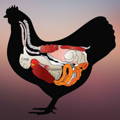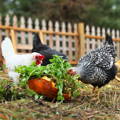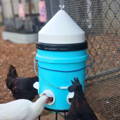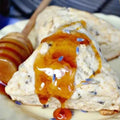
Poultry Sour Crop: Causes, Symptoms & Treatment
Discover the ins and outs of sour crop in poultry – from causes and symptoms to treatment. Learn how to recognize early signs, reduce mortality rates, and implement preventive measures.
Left untreated, sour crop can be deadly and lead to impacted crop in your backyard chickens.
Subscribe
To join our mailing list and never miss an update!
Keeping chickens can be a rewarding experience, but it's important for poultry owners to be aware of potential health issues that may affect their feathered friends. One such concern is sour crop, a condition that can impact a chicken's digestive system and be a serious cause of death if not treated immediately. In this article, we'll explore what sour crop is, its causes, symptoms, and how to treat it.

What is Sour Crop?
"Sour crop" is a term describing a health issue in chickens where a part of their digestive system, called the crop, gets swollen and infected. The crop acts like a pouch at the base of their neck, storing and moistening food before it moves through the digestive tract.
This condition is caused by a yeast infection from a bacteria called Candida albicans, the same one that causes 'thrush' in babies.
Normally, Candida is in chickens without causing problems, but issues arise when it grows too much, thickening the crop wall and enlarging the crop. This disrupts the natural bacteria in the crop, leading to digestion problems.
As a result, the chicken can't properly empty its stomach, causing a blockage. If this continues, the chicken loses weight and might even die.

Causes of Sour Crop
Sour crop can occur when there is a disruption in the normal balance of microorganisms in the crop. Several factors can contribute to this imbalance, leading to the development of sour crop. Some common causes include:
- Spoiled or Moldy Feed
Chickens, like any animals, can be sensitive to the quality of their food. Consuming spoiled or moldy feed can introduce harmful bacteria or yeast into the crop, triggering inflammation. - Overeating/Snacking
Chickens may sometimes overeat, especially if there's an abundance of food available. For example, allowing your feeders to get empty and then filling them up can cause your chickens to gorge when they eat because of the “feast or famine” survival instinct.
Overindulging in treats, even healthy ones, can create an imbalance in the digestive system that may create the conditions that make your chickens susceptible to sour crop. Excessive intake and sudden changes in diet can overwhelm the digestive system, leading to sour crop. - Digestive Issues
Certain digestive problems in chickens, such as a slow crop or blockages, can contribute to the development of sour crop. These issues may hinder the normal flow of food through the digestive tract.

Symptoms of Sour Crop
Sour crop and impacted crop are related and often show similar signs, but their treatment is very different. If left untreated, sour crop can evolve into impacted crop. Recognizing the symptoms of sour crop is crucial for early detection and prompt treatment. Keep an eye out for the following signs:
- Regurgitation
Chickens with sour crop may regurgitate their food. This can be observed as the bird spitting up undigested material. - Bad Breath
An unpleasant odor from a chicken's mouth can indicate sour crop. The fermentation of food in the crop produces gases that contribute to bad breath.

- Distended or Squishy Crop
A healthy crop should feel firm and pliable. In cases of sour crop, the crop may become distended, feeling squishy to the touch. - Decreased Appetite
Chickens with sour crop may show a decreased interest in eating. This can result from discomfort or pain associated with the inflamed crop. - Lethargy
Chickens in the advanced stages of a sour crop infection display signs of lethargy. They may appear to have their feathers "fluffed and puffed" out, walking in a hunched over position, if they are walking at all. This is an emergency situation and needs to be addressed immediately.
TREATING Sour Crop
If you suspect that your chicken has sour crop, it's essential to take prompt action. Here are steps you can take to treat sour crop:
- Isolate the Chicken
Separate the affected chicken from the flock to reduce environmental stress and to monitor its condition closely. - Withhold Food
Temporarily stop giving the chicken any food. This allows the crop to empty and reduces the strain on its digestive system. - Provide Water
Make sure the chicken has access to clean water. Hydration is important for recovery. - Crop Massage
Gently massaging the crop can help move the contents along the digestive tract. Be cautious and gentle to avoid causing additional stress to the bird.

- Treat with Yogurt
Feed the chicken plain yogurt with live cultures. The probiotics in the yogurt can help balance the crop's microbial environment. - Antifungal Medication
Consult with a veterinarian who may recommend antifungal medication to specifically target and eliminate the Candida infection. - Monitor and Gradual Feeding
Keep a close eye on the chicken's progress. Once it shows improvement, gradually reintroduce a light and easily digestible diet. - Supportive Care
Provide supportive care to your chicken, including maintaining a comfortable and clean environment. Keep the bird warm and hydrated during the recovery period. - Vet Consultation
In serious situations, when a chicken cannot empty its’ crop, there may be a need for a procedure to empty and flush it. This treatment should only be performed by a veterinarian because if done incorrectly, it could be fatal for the bird.
A veterinarian can also provide a thorough examination and may prescribe medications to address the underlying microbial imbalance.
Trending Articles
Preventing Sour Crop
Prevention plays a key role in maintaining the overall health of your poultry flock. Consider the following tips to prevent sour crop:
- Monitor Feed Quality
Regularly inspect your chicken feed for any signs of spoilage or mold. Keep your feed in moisture proof containers and off the ground. Providing fresh and clean feed is essential for preventing digestive issues. - Adjust Diet
Ensure that your chickens have a balanced and nutritious diet. High-quality feed can contribute to overall digestive health and help prevent sour crop. Treats, even healthy ones, should be offered sparingly.
Radical and sudden changes to their diet can create the conditions that are ripe for a microbial imbalance in the digestive system of your backyard chickens. - Control Food Intake
Avoid overfeeding your chickens and scarcity of feed scenarios. When your flock feels like there is competition for feed or they aren’t sure when they’re next meal will be, your feathered-friends will gorge and overeat when feed is available.
Provide a constant and appropriate amount of feed to prevent excessive consumption, which can contribute to digestive problems. For flocks over 6, we recommend having at least two feeders to avoid competition for access to them.

- Clean Drinking Water Available at All Times
Water is the lubricant of life and a necessary ingredient in the proper digestion of food. Make sure that your chickens always have clean water available for drinking to aid the digestion process and minimize the chance of sour crop.
Adding apple cider vinegar to your chickens' drinking water is an easy way to stave off bacteria after they've been treated. You can include this in your regular routine to keep your chickens healthy. - Hygiene Practices
Maintain good hygiene in the coop and nesting areas. Cleanliness reduces the risk of bacterial contamination and promotes a healthy environment for your chickens. - Regular Health Checks
Perform regular health checks on your flock. Keep an eye on their behavior, appetite, and overall well-being. Early detection of any issues allows for timely intervention.
In conclusion, sour crop is a condition that poultry owners should be aware of to ensure the well-being of their chickens. Understanding the causes, symptoms, and treatment options empowers chicken keepers to take proactive measures and provide the necessary care for their feathered companions. By promoting good nutrition, hygiene, and regular health monitoring, poultry enthusiasts can contribute to the overall health and happiness of their flock.
Trending Products
Copyright©2024 All rights reserved. We love to have you share our article as long as you include a direct link to this page. This article or any portion thereof , including all images, may not be reproduced or used in any manner whatsoever without the express written permission of Gypsy Shoals Farm.




